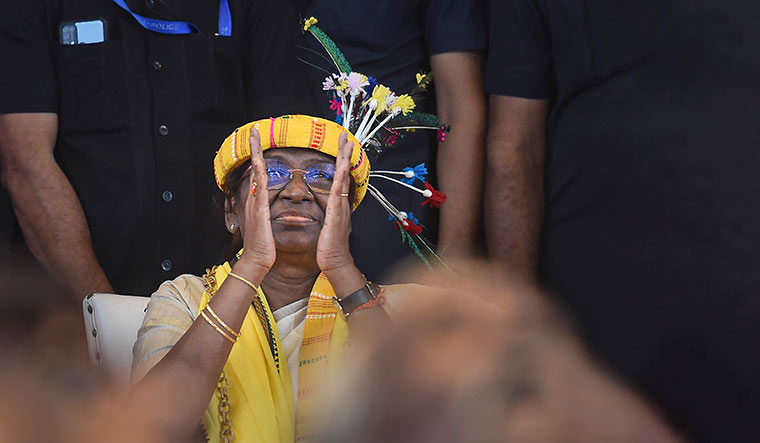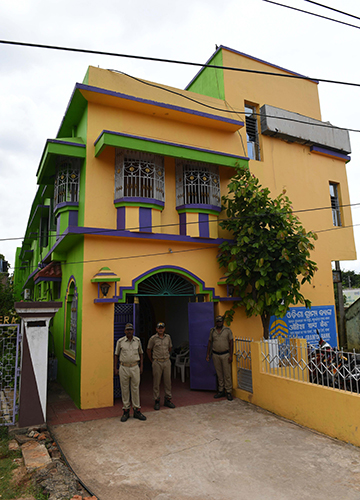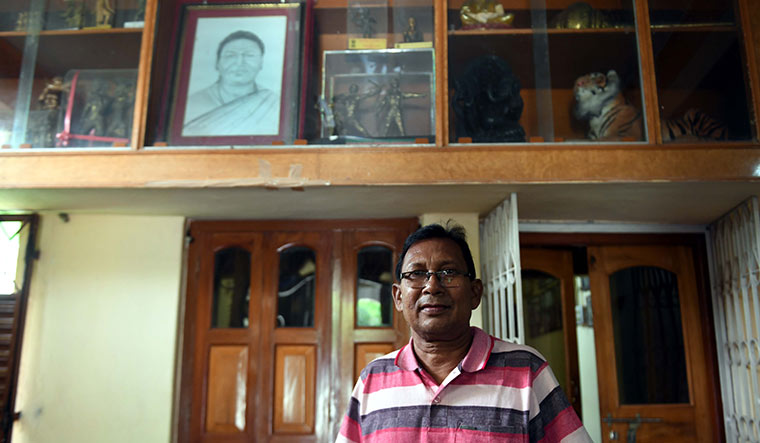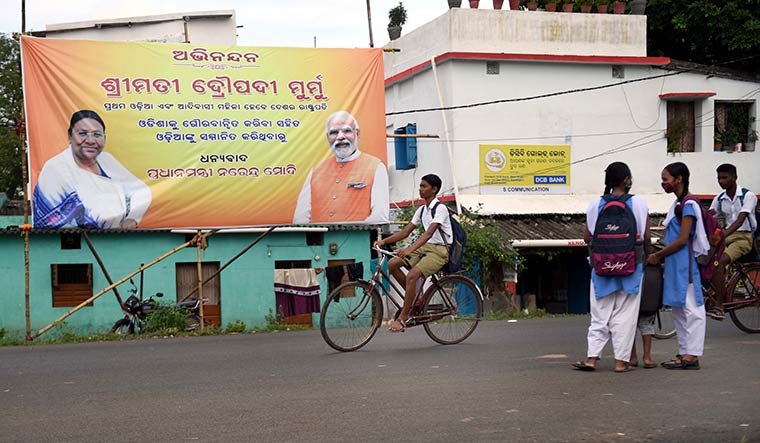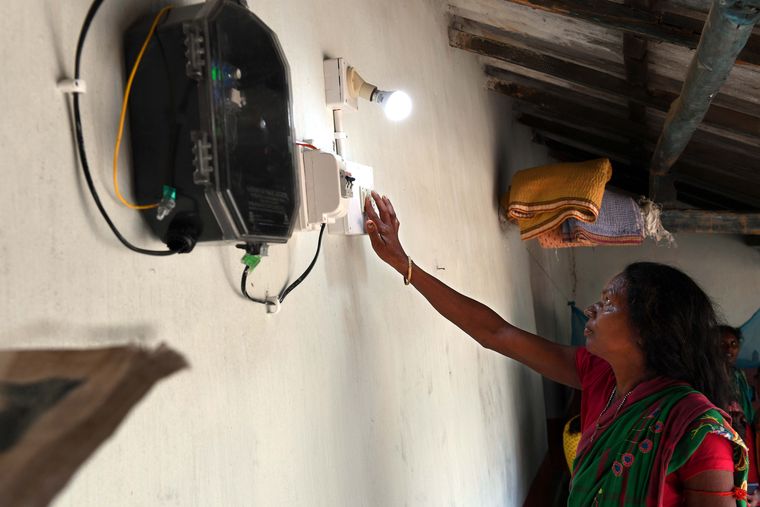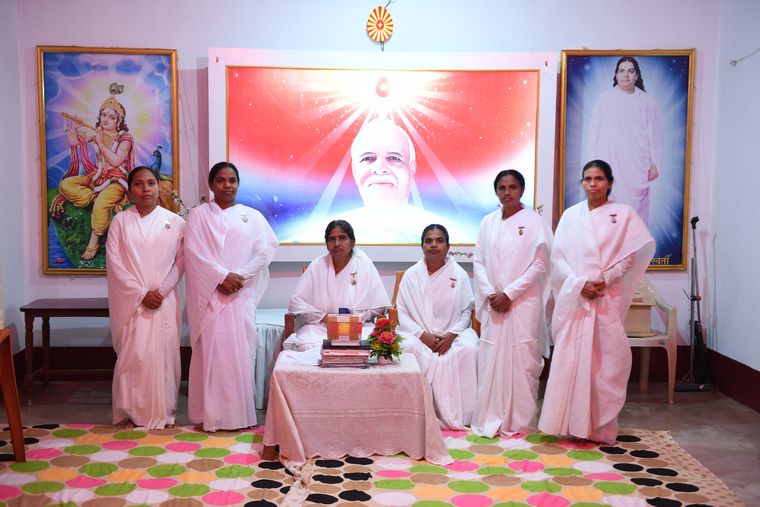It was a routine morning for Tarani Tudu.
Indeed, his elder sister, Droupadi Murmu, had just been named the presidential candidate of the ruling National Democratic Alliance. She would become the next resident of the Rashtrapati Bhavan in Delhi, the Rashtrapati Nilayam in Secunderabad and The Retreat Building in Shimla. Within the Commonwealth she would be The Honourable Droupadi Murmu, and elsewhere abroad, Her Excellency.
But Tarani had pressing domestic matters at hand. He had bought a bag of vegetables from the market, and he had to steer clear of journalists camped in his hometown—Rairangpur in Odisha’s Mayurbhanj district—to get it to the kitchen on time. He manoeuvred his gearless scooter through the group of guards outside his house, parked it in a corner, turned the engine off, and lugged the bag into the kitchen, where his wife was cooking lunch. “She cleans the house and washes the dishes. I get the groceries,” Tarani quipped.
A similar scene was playing out 20km away in Dungarsahi, a sparsely populated tribal hamlet on the edge of a thick forest. The road leading to Dungarsahi—scenic, but usually desolate—was witnessing unusual traffic. A dozen employees of the electricity department, complete with yellow hard hats, were hooking up a small mud-and-straw house to the grid.
The two-room house, resembling a jumbo train compartment, belongs to Chudamuni Tudu. Her late husband, Bhagat Charan Tudu, was Murmu’s brother. As electricity is uncommon in Dungarsahi, women and children from the neighbourhood were at the house to mark the milestone. A television reporter barged into the compound holding a mic. He asked the women to line up in front of the house and gave them a crash course on how to do a PTC—piece to camera. The women were amused, the reporter was visibly stressed, and the guys in hard hats were famished. The unruffled Chudamuni was busy cooking lunch for them all.
Chudamuni’s backyard has mounds of ash from wood fires; she does not have cooking gas. The firewood comes from the forest that borders the backyard. On most mornings, she walks some distance to collect drinking water, braving the wild elephants that have a free pass in the area. “We are content,” she said.
Tarani and Chudamuni have a pet name for Murmu—Puthi. With Puthi’s elevation to the Rashtrapati Bhavan, their lives, too, are changing. Tarani’s house, for example, is now guarded by commandos. It is one half of a two-storey building on Mahuldiha Road; Murmu lives in the other half.
The outside of the building is painted yellow, violet and green. The porch has been turned into a drawing room, and the walls have a series of tribal paintings. Chairs stacked in a corner announce that the resident has many visitors. Although Murmu has been in politics for 25 years—as councillor, legislator, minister and governor, before becoming India’s first president from the tribal community—it is only now that her family is enjoying the fruits of her influence.
When at home, the 64-year-old Murmu is a creature of habits, says Tarani. She wakes up at around 3am to meditate. At daybreak, she walks five kilometres, practises yoga, has breakfast, and meditates again. How did she react when the BJP announced her candidature on the night of June 20? “She folded her hands and closed her eyes as if she were praying to Lord Shiva,” said Tarani.
A vegetarian, she avoids garlic and onion, and has inspired many members of her family to turn vegetarian. She uses her smartphone only to make and receive calls, and avoids apps which are addictive. She hardly watches television, but makes time for music reality shows involving children. Hailing from the Santhal tribe, she is known to perform the tribe’s traditional dance at events and festivals.
Murmu was born and raised in Uparbeda village, around 15km from Rairangpur. Her father, Biranchi Narayan Tudu, was a village headman. Though her career took her to bigger towns and cities, she has always been rooted. “She was here a few months ago and, as always, asked about my well-being,” said Chudamuni.
Around 20km from Rairangpur is Tentoposi village, where Basudep Behra, aka Basu Master, lives. A much respected teacher in the neighbourhood, Behra taught Murmu in classes six and seven at Uparbeda upper primary school. A visibly proud Behra switched between Odia, English and broken Hindi while remembering Murmu’s schooldays.
Behra said Murmu had shown leadership qualities right from her schooldays. “One day, we found that there was no chalk duster [to clean the blackboard] in class,” he said. “She went home, made three dusters from rags and brought them to me the next day. I was surprised by how quickly she found a solution to the problem.”
He said that Murmu, as class monitor, would control boys, who outnumbered the girls. If a teacher was absent or late to the class, she would maintain order, he said. “She was a competitive runner, and did not shy away from singing on special occasions like Independence Day,” said Behra, as he sipped tea while being surrounded by a dozen villagers who had volunteered to be translators.
After her primary education, Murmu moved to Capital Girls’ High School in Bhubaneswar and graduated from Rama Devi Women’s College. She married Shyam Charan Murmu, a bank employee, and became a clerk in the state irrigation department. When Shyam was transferred to a branch near Rairangpur, she quit her job and moved there with their three children. Never the one to sit idle, she started teaching at Sri Aurobindo Integral Education Centre, the only private school there.
“She was a strict teacher who knew how to control students,” said Abhishek Sharma, Murmu’s student in Class 7. “I do not remember her shouting or beating students ever.” On the night she was announced as the presidential candidate, Abhishek, 38, rushed to her house. And he got a surprise. “Though there was a huge crowd, she recognised me and called out my name,” he said. “I was overjoyed.”
Murmu made her political debut in 1997 in Rairangpur. She was elected to the municipal council and became vice-chair of the town’s sanitation committee. The people of Rairangpur still remember how she crisscrossed the town in her Maruti 800 to keep tabs on sanitation staff. “She would be on the streets, monitoring the work and guiding authorities. She was committed, and it earned her fame and respect,” said a resident.
Murmu was twice elected from Rairangpur assembly constituency—in 2000 and 2004—and was minister in the coalition government of the Biju Janata Dal (BJD) and the BJP. People remember her opening a road transport office in Rairangpur and installing a statue of tribal icon Birsa Munda in the centre of the town.
Murmu is a product of the political dynamics that existed in Odisha in the mid-1990s. The Jharkhand Mukthi Morcha and the Congress held sway in the tribal belt, while the BJP’s popularity was limited to Hindi-speaking migrants and the Marwari community. The BJP’s search for a tribal face ended with Murmu.
“It was Diwakar Mohanto, a schoolteacher and BJP worker, who recommended her name to us,” said Rajkishor Das, Morada MLA and close associate of Murmu. “The BJP was not popular among tribals back then. We were looking for a person who could influence the Santhal community. And here was a woman of the tribe who was educated and hardworking. We welcomed her into the party and gave her an assembly ticket.”
Das was chairman of the Rairangpur sanitation committee when Murmu was vice-chair. He said the BJP’s experiment paid rich dividends as Murmu brought in 50 per cent of tribal votes in Mayurbhanj district. Even though he is now in the BJD, Das maintains cordial relations with Murmu. He says he has “never seen a woman leader like her from the tribal community”.
From 2000 to 2004, Murmu handled portfolios such as fisheries, animal resources development, commerce and transport. Despite proving her mettle as minister, she did not get a cabinet berth in her second term as legislator. “She took it positively and focused on her performance in the assembly. This won her the best MLA award. There were attempts to poach her, but she resisted,” said Bikash Chandra Mohanto, Murmu’s personal assistant when she was Jharkhand governor.
But, in her second term as MLA, her grit and tact underwent a test. In 2006, more than a dozen tribals were killed in police firing on people protesting a proposed Tata Steel plant in Kalinganagar. The tribals were up in arms.
Murmu was at that time state president of the BJP’s Scheduled Tribe Morcha. Das recalled how she handled the situation. “It was a very serious incident and the impact was huge,” he said. “As part of the damage control exercise, the BJP sent a member of the tribal community to the Rajya Sabha. But the anger had to be addressed. Murmu had to do a balancing act—she was a government representative as well as an adivasi. She talked to the tribals and ensured that the situation did not escalate further.”
Her second term in the assembly was also a time of personal losses for Murmu. In May 2009, she ran for parliament and lost. Five months later, her son Laxman died unexpectedly. Murmu was crushed. Well-wishers led her to a Brahma Kumaris ashram, hoping that she would find peace.
A narrow bylane leads to the Rairangpur centre of the Brahma Kumaris. B.K. Minati, a senior administrator there, said Murmu was an earnest student. “She would be at the centre by 7am sharp. In the five years she came regularly, there was not a single day on which she was late by even a minute,” she said.
Members of the organisation remember Murmu’s first visit. She was grieving, depressed and had not slept for weeks. She was even unable to cry, they said. “Meditation calmed her heart,” said Minati. At Murmu’s house, an entire wall is dominated by a huge photo of the Brahma Kumaris founder, Dada Lekhraj.
In 2013, her second son died in a road accident. Murmu’s reserves of peace were deep at this time. “She faced it bravely. She even sat down and spoke to all of us when we went to visit her the next day,” said a Brahma Kumaris member. The next year, she lost Shyam, her husband.
Between 2009 and 2014, Murmu lost four close family members. Her lone surviving child, Itishree, is a bank employee; she is married to rugby player Ganesh Hembram.
Murmu poured her grief into a school, literally. At Pahadpur, Shyam’s village, she established a school in memory of him and their sons. More than 60 students study here. The modern campus, which has statues of Shyam and the boys, is a shining example of how personal grief can be turned into something fruitful for society.
In 2015, Murmu received an unexpected call. “She and I were at a wedding with other party elders,” said Mohanto. “The BJP leadership called saying that they needed her documents to process [her appointment] as governor of Jharkhand. Hearing this, she broke into tears. She wept for her loved ones who were not around to celebrate her success.”
She was in the Raj Bhavan in Ranchi till July 2021. During her tenure, she toured tribal areas extensively. Her supporters and relatives said that she welcomed them warmly at the Raj Bhavan. “Whenever we face any problem, we would just call her,” said Bhakthobandho Tudu, Murmu’s cousin who lives in her ancestral house. “She once saved me from death. I had fallen terribly sick a few years ago and she did everything to get me good treatment. If I am healthy now, it is because of her.” Whenever Murmu visits him, Bhakthobandho prepares her favourite dish—panta bhat, a fermented rice dish.
Naba Charan Majhi, a BJP legislator in Mayurbhanj, said Murmu was a simple leader who was on good terms with everyone. But when it came to matters affecting tribals, she was uncompromising. According to Das, her boldest move was when there was “pressure from the top” to make amendments to the tribal tenancy law in Jharkhand. Murmu, as governor, returned the bill to protect adivasis’ interests.
“She is exceptional in this regard,” said Das. “Once I promised at a public meeting that I would learn Santhali and speak it. I forgot about it, but she remembered and used to tease me about it. She is very committed to the tribal cause and to preserving its culture.”
Undoubtedly, it is time that the original inhabitants of India had a champion in the highest office in this land.


